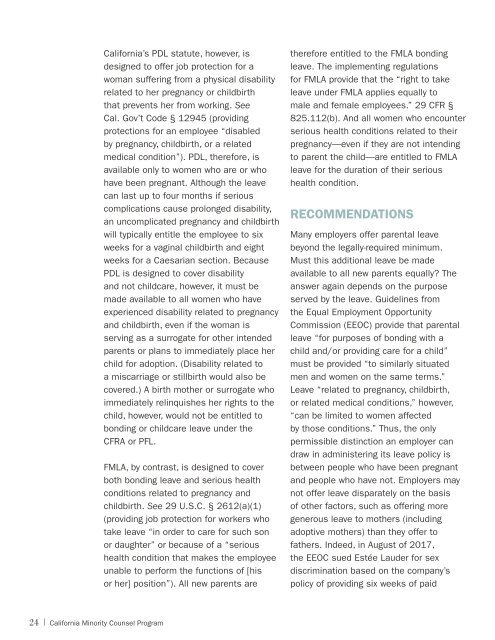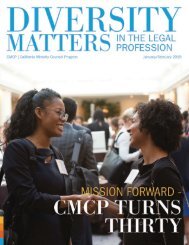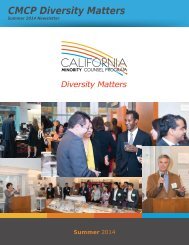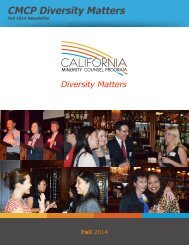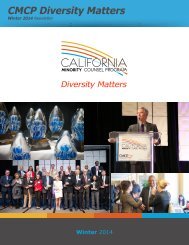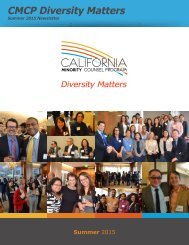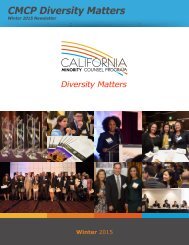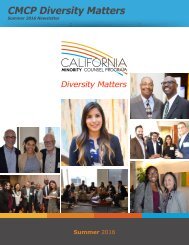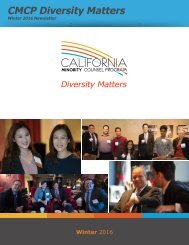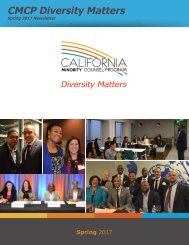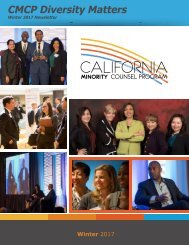CMCP Diversity Matters - May/June 2018
California Minority Counsel Program Diversity Matters - May/June 2018
California Minority Counsel Program Diversity Matters - May/June 2018
You also want an ePaper? Increase the reach of your titles
YUMPU automatically turns print PDFs into web optimized ePapers that Google loves.
California’s PDL statute, however, is<br />
designed to offer job protection for a<br />
woman suffering from a physical disability<br />
related to her pregnancy or childbirth<br />
that prevents her from working. See<br />
Cal. Gov’t Code § 12945 (providing<br />
protections for an employee “disabled<br />
by pregnancy, childbirth, or a related<br />
medical condition”). PDL, therefore, is<br />
available only to women who are or who<br />
have been pregnant. Although the leave<br />
can last up to four months if serious<br />
complications cause prolonged disability,<br />
an uncomplicated pregnancy and childbirth<br />
will typically entitle the employee to six<br />
weeks for a vaginal childbirth and eight<br />
weeks for a Caesarian section. Because<br />
PDL is designed to cover disability<br />
and not childcare, however, it must be<br />
made available to all women who have<br />
experienced disability related to pregnancy<br />
and childbirth, even if the woman is<br />
serving as a surrogate for other intended<br />
parents or plans to immediately place her<br />
child for adoption. (Disability related to<br />
a miscarriage or stillbirth would also be<br />
covered.) A birth mother or surrogate who<br />
immediately relinquishes her rights to the<br />
child, however, would not be entitled to<br />
bonding or childcare leave under the<br />
CFRA or PFL.<br />
FMLA, by contrast, is designed to cover<br />
both bonding leave and serious health<br />
conditions related to pregnancy and<br />
childbirth. See 29 U.S.C. § 2612(a)(1)<br />
(providing job protection for workers who<br />
take leave “in order to care for such son<br />
or daughter” or because of a “serious<br />
health condition that makes the employee<br />
unable to perform the functions of [his<br />
or her] position”). All new parents are<br />
therefore entitled to the FMLA bonding<br />
leave. The implementing regulations<br />
for FMLA provide that the “right to take<br />
leave under FMLA applies equally to<br />
male and female employees.” 29 CFR §<br />
825.112(b). And all women who encounter<br />
serious health conditions related to their<br />
pregnancy—even if they are not intending<br />
to parent the child—are entitled to FMLA<br />
leave for the duration of their serious<br />
health condition.<br />
RECOMMENDATIONS<br />
Many employers offer parental leave<br />
beyond the legally-required minimum.<br />
Must this additional leave be made<br />
available to all new parents equally? The<br />
answer again depends on the purpose<br />
served by the leave. Guidelines from<br />
the Equal Employment Opportunity<br />
Commission (EEOC) provide that parental<br />
leave “for purposes of bonding with a<br />
child and/or providing care for a child”<br />
must be provided “to similarly situated<br />
men and women on the same terms.”<br />
Leave “related to pregnancy, childbirth,<br />
or related medical conditions,” however,<br />
“can be limited to women affected<br />
by those conditions.” Thus, the only<br />
permissible distinction an employer can<br />
draw in administering its leave policy is<br />
between people who have been pregnant<br />
and people who have not. Employers may<br />
not offer leave disparately on the basis<br />
of other factors, such as offering more<br />
generous leave to mothers (including<br />
adoptive mothers) than they offer to<br />
fathers. Indeed, in August of 2017,<br />
the EEOC sued Estée Lauder for sex<br />
discrimination based on the company’s<br />
policy of providing six weeks of paid<br />
24 | California Minority Counsel Program


